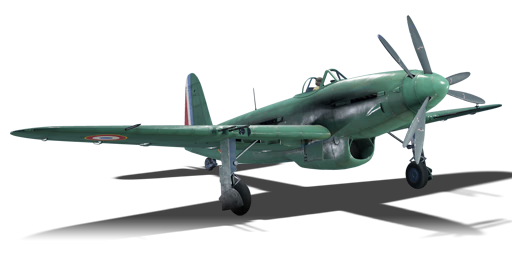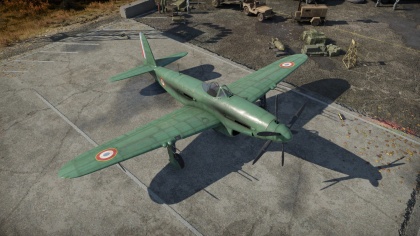Difference between revisions of "VB.10C-1"
(→Usage in battles) (Tag: Visual edit) |
m (→Usage in battles) |
||
| Line 139: | Line 139: | ||
== Usage in battles == | == Usage in battles == | ||
| − | The VB.10C-1 like most heavy fighters is reliant on side climbing to engage enemy fighters, however this isn't the only way to play the VB.10C-1, if you decide to side climb and wait for enemy planes to drop down to lower altitudes they will find themselves in peril when a experienced pilot in a VB | + | <!-- ''Describe the tactics of playing in an aircraft, the features of using vehicles in a team and advice on tactics. Refrain from creating a "guide" - do not impose a single point of view, but instead, give the reader food for thought. Examine the most dangerous enemies and give recommendations on fighting them. If necessary, note the specifics of the game in different modes (AB, RB, SB).'' --> |
| + | The VB.10C-1, like most heavy fighters, is reliant on side climbing to engage enemy fighters, however this isn't the only way to play the VB.10C-1, if you decide to side climb and wait for enemy planes to drop down to lower altitudes they will find themselves in peril when a experienced pilot in a VB.10C-1 comes booming past with its quick dive rate and deadly armament of 4 x 20 mm Hispano 404 cannons. The best tactic when flying solo is Boom & Zoom and play as the team's support fighter, as its great acceleration and heavy weight can allow you to make fast attacks against unsuspecting enemy fighters at lower altitudes that are pre-occupied with fighting friendly aircraft. The heavy weight can also help carry the planes speed when extending and helps retain a bit of speed when going back into a climb, be aware however that the VB.10C-1's size and weight makes it a considerable target if you happen to miss your engagement. The best tactic when flying in a group of two or more is to help teammates that are struggling in a dogfight with enemy fighters, as a large target the VB.10C-1 can distract enemy fighters and outrun most using its advantage in weight and energy which allows teammates to slide onto the enemies six o'clock and finish them off. | ||
If you need to do a quick turn, set combat flaps and reduce the power of the engine to around 50%, then turn and close the combat flaps when half-finished with your manoeuvre. Be aware that turning in the VB.10C-1 is a way to intentionally or unintentionally bleed off any built-up energy. Conserve energy when possible in the VB.10C-1 as it lacks the capabilitys to dogfight other fighters in fast or slow turning engagements. | If you need to do a quick turn, set combat flaps and reduce the power of the engine to around 50%, then turn and close the combat flaps when half-finished with your manoeuvre. Be aware that turning in the VB.10C-1 is a way to intentionally or unintentionally bleed off any built-up energy. Conserve energy when possible in the VB.10C-1 as it lacks the capabilitys to dogfight other fighters in fast or slow turning engagements. | ||
Revision as of 11:09, 5 November 2020
Contents
| This page is about the French twin-engine fighter VB.10C-1. For the other version, see VB.10-02. |
Description
The VB.10C-1 is a rank III French twin-engine fighter
with a battle rating of 3.7 (AB/SB) and 4.0 (RB). It was introduced in Update 1.73 "Vive la France".
General info
Flight Performance
Describe how the aircraft behaves in the air. Speed, manoeuvrability, acceleration and allowable loads - these are the most important characteristics of the vehicle.
| Characteristics | |||||||
|---|---|---|---|---|---|---|---|
| Stock | |||||||
| Max Speed (km/h at 7,000 m) |
Max altitude (meters) |
Turn time (seconds) |
Rate of climb (meters/second) |
Take-off run (meters) | |||
| AB | RB | AB | RB | AB | RB | ||
| 679 | 659 | 11000 | 25.4 | 26.5 | 11.7 | 11.7 | 700 |
| Upgraded | |||||||
| Max Speed (km/h at 7,000 m) |
Max altitude (meters) |
Turn time (seconds) |
Rate of climb (meters/second) |
Take-off run (meters) | |||
| AB | RB | AB | RB | AB | RB | ||
| 746 | 710 | 11000 | 23.2 | 24.0 | 23.6 | 15.4 | 700 |
Details
| Features | ||||
|---|---|---|---|---|
| Combat flaps | Take-off flaps | Landing flaps | Air brakes | Arrestor gear |
| ✓ | ✓ | ✓ | X | X |
| Limits | ||||
|---|---|---|---|---|
| Wing-break speed (km/h) |
Gear limit (km/h) |
Combat flaps (km/h) |
Max Static G | |
| + | - | |||
| 820 | 450 | 520 | ~11 | ~6 |
| Optimal velocities | |||
|---|---|---|---|
| Ailerons (km/h) |
Rudder (km/h) |
Elevators (km/h) |
Radiator (km/h) |
| < 380 | < 380 | < 540 | > 340 |
| Compressor (RB/SB) | ||
|---|---|---|
| Setting 1 | ||
| Optimal altitude | 100% Engine power | WEP Engine power |
| 3,000 m | 1,200 hp | 1,536 hp |
| Setting 2 | ||
| Optimal altitude | 100% Engine power | WEP Engine power |
| 8,000 m | 1,120 hp | 1,433 hp |
Survivability and armour
- 50 mm Bulletproof glass in front and rear of the cockpit.
Armaments
Offensive armament
The VB.10C-1 is armed with:
- 4 x 20 mm Hispano 404 cannons, wing-mounted (150 rpg = 600 total)
The four cannons are arranged in bundles of two mounted in each wing. Each is armed with the same amount of ammunition, which means that all guns will fire with each other until empty.
Usage in battles
The VB.10C-1, like most heavy fighters, is reliant on side climbing to engage enemy fighters, however this isn't the only way to play the VB.10C-1, if you decide to side climb and wait for enemy planes to drop down to lower altitudes they will find themselves in peril when a experienced pilot in a VB.10C-1 comes booming past with its quick dive rate and deadly armament of 4 x 20 mm Hispano 404 cannons. The best tactic when flying solo is Boom & Zoom and play as the team's support fighter, as its great acceleration and heavy weight can allow you to make fast attacks against unsuspecting enemy fighters at lower altitudes that are pre-occupied with fighting friendly aircraft. The heavy weight can also help carry the planes speed when extending and helps retain a bit of speed when going back into a climb, be aware however that the VB.10C-1's size and weight makes it a considerable target if you happen to miss your engagement. The best tactic when flying in a group of two or more is to help teammates that are struggling in a dogfight with enemy fighters, as a large target the VB.10C-1 can distract enemy fighters and outrun most using its advantage in weight and energy which allows teammates to slide onto the enemies six o'clock and finish them off.
If you need to do a quick turn, set combat flaps and reduce the power of the engine to around 50%, then turn and close the combat flaps when half-finished with your manoeuvre. Be aware that turning in the VB.10C-1 is a way to intentionally or unintentionally bleed off any built-up energy. Conserve energy when possible in the VB.10C-1 as it lacks the capabilitys to dogfight other fighters in fast or slow turning engagements.
Manual Engine Control
| MEC elements | ||||||
|---|---|---|---|---|---|---|
| Mixer | Pitch | Radiator | Supercharger | Turbocharger | ||
| Oil | Water | Type | ||||
| Controllable | Controllable Not auto controlled |
Controllable Not auto controlled |
Controllable Not auto controlled |
Separate | Controllable 2 gears |
Not controllable |
Modules
| Tier | Flight performance | Survivability | Weaponry | |
|---|---|---|---|---|
| I | Fuselage repair | Radiator | ||
| II | Compressor | Airframe | ||
| III | Wings repair | Engine | Offensive 20 mm | |
| IV | Engine injection | Cover | New 20 mm cannons | |
Pros and cons
Pros:
- Very fast at medium to low altitudes
- Average climb rate (inferior to contemporary German/Italian counterparts)
- Decent ammo count
- Good turn rate (can manoeuvre with Bf 109s)
- Brutal acceleration in a dive
- Quite strong combat flaps
- Good horizontal energy retention
- Good cockpit visibility (important for simulator battle players)
- If one engine/propeller fails the VB still flies very well with the other one; so you can easily return to the airfield for repairs
Cons
- Bad acceleration rate (except in a dive)
- Awful vertical turner
- Rudder is unresponsive at high speeds
- Very heavy feeling in the air
- Stock belts are unimpressive
- Stock guns are inaccurate
- Similar to Do-335, guns can be difficult to align at high speeds
- Bad roll rate is made even worse with unresponsive rudder
- Guns are mounted far outside the centre, so it's hard to hit small targets with full force (try convergence point at ~600 m)
- All guns have a 150 round magazine, if one gun is empty... all guns are empty; so watch your ammo stats
History
Describe the history of the creation and combat usage of the aircraft in more detail than in the introduction. If the historical reference turns out to be too big, take it to a separate article, taking a link to the article about the vehicle and adding a block "/ History" (example: https://wiki.warthunder.com/(Vehicle-name)/History) and add a link to it here using the main template. Be sure to reference text and sources by using <ref></ref>, as well as adding them at the end of the article with <references />. This section may also include the vehicle's dev blog entry (if applicable) and the in-game encyclopedia description (under === Encyclopedia Info ===, also if applicable).
Media
See also
Links to the articles on the War Thunder Wiki that you think will be useful for the reader, for example:
- reference to the series of the aircraft;
- links to approximate analogues of other nations and research trees.
External links
Paste links to sources and external resources, such as:
- topic on the official game forum;
- encyclopedia page on the aircraft;
- other literature.
| Arsenal Aeronautical (Arsenal de l'Aéronautique) | |
|---|---|
| Fighters | VB.10-02 · VB.10C-1 |
| V.G.33C-1 | |
| France twin-engine fighters and strike aircraft | |
|---|---|
| Twin-engine fighters | Potez 630 · Potez 631 · VB.10C-1 · VB.10-02 |
| Strike aircraft | Br.693AB2 · ▄AD-4 · ▄AD-4NA |
| Netherlands | |
| Twin-engine fighters | ◗Fokker G.IA |
| Strike aircraft | ◘Firefly F.Mk.IV |





